Pulse in the ear causes and treatment. Is pulsation in the ear scary and how to deal with it?
The feeling of pulsation is familiar to many people, especially those who have flown on an airplane or climbed mountains by car. This feeling may be caused by other reasons that pose health risks. There are many factors that can cause a feeling of pulsation in the ears - changes in pressure when rising to a height, load on the balance apparatus when traveling, seasickness.
Reasons
Causes of pulsation in the ears:
- Changes in atmospheric pressure in weather-sensitive people.
- Hypo-or.
- Heart diseases.
- Pregnancy and hormonal diseases(hypothyroidism, diabetes mellitus).
- Injuries to the hearing organs or inflammatory processes, neuroma of the eighth pair of nerves.
- Violation cerebral circulation.
- Osteochondrosis.
- Swelling of wax plug in the ear.
- Prolonged exposure to loud sounds.
- Anemia.
- Taking ototoxic drugs: aminoglycosides, oral contraceptives, non-steroidal anti-inflammatory drugs.
- Intense physical activity.
It is useful to know why them: the main reasons.
The main reasons for the appearance and features of the manifestation of pathology.
Change in ambient pressure
As pressure rises and falls, the ears may become stuffy, and sometimes pulsation appears. This happens when diving to great depths or rising to a height. Vestibular apparatus bears the load. Sometimes this is accompanied by nausea and vomiting.
Changes in atmospheric pressure are one of the reasons why the ear pulsates, but does not hurt when the weather changes. Replacing a cyclone with an anticyclone and vice versa may be accompanied by throbbing pain in the head and poor health.
High or low blood pressure
Seizures hypertension- one of the reasons why there is pulsation in the ears. As blood pressure rises, intracranial pressure also increases. There is swelling of the brain, tension in its blood vessels, and saturation of their walls with plasma proteins.
Pulsation in the head is also possible with low blood pressure. In this case, the brain lacks oxygen and ischemia increases. Then the person feels noise and pulsation. Sometimes loss of consciousness is possible.
Heart disease
Stenosis aortic valve after rheumatic diseases leads to impaired blood circulation throughout the body. ( oxygen starvation) of the brain leads to the fact that a person feels pulsation of blood vessels or noise, ringing.
Hormonal changes
Diabetes mellitus, hypothyroidism, and pregnancy can lead to swelling of the auditory nerve, as well as impaired blood supply to the brain. This may cause dizziness.
Pregnancy can provoke kidney and liver dysfunction. The consequence of this will be an increase in blood pressure, which causes throbbing pain in the ear.
Hearing diseases and wax plug
Inflammatory processes and damage sometimes cause pulsation. Otitis, traumatic brain injuries, tumors of the auditory nerve can become a source of the problem. Otosclerosis may be side effect some drugs.
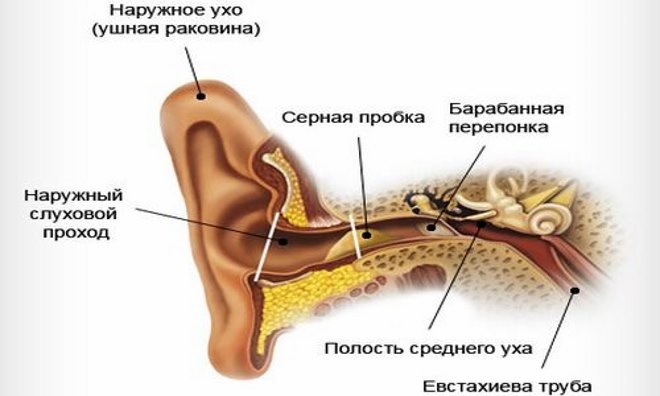 When blocked ear canal the sulfur plug pulsates, but does not hurt. Sulfur swells with water after bathing. Cotton buds They only aggravate the problem by pushing the discharge inside and compacting it. You need the help of an ENT doctor, rinsing with a Janet syringe, or using sulfur-dissolving compounds, such as Acerumen. After these manipulations, the symptoms causing discomfort disappear.
When blocked ear canal the sulfur plug pulsates, but does not hurt. Sulfur swells with water after bathing. Cotton buds They only aggravate the problem by pushing the discharge inside and compacting it. You need the help of an ENT doctor, rinsing with a Janet syringe, or using sulfur-dissolving compounds, such as Acerumen. After these manipulations, the symptoms causing discomfort disappear.
Poor blood circulation in the brain and osteochondrosis as a cause of pulsation
And hemorrhagic atherosclerosis of the neck vessels leads to a disorder of the blood supply to the head. The result is throbbing, loss of balance, pain, weakness, and poor health.
Osteochondrosis is degenerative disease leads to destruction cartilage tissue intervertebral discs, as well as pinched nerves and blood vessels leading to the brain. The result is hearing loss, dizziness, and pulsation.
Anemia
A decrease in the number of red blood cells and the level of hemoglobin in the blood can cause a feeling of noise, hearing loss, and pulsation of the head. The reason is oxygen starvation of the brain. Iron deficiency, excessive blood loss during menstruation or injury leads to anemia.
Ototoxic drugs
Such means include antibacterial drugs Aminoglycosides, oral contraceptives to prevent pregnancy, non-steroidal drugs. Birth control pills can cause otosclerosis.
Physical activity
Pulsation during physical activity is caused by more active work of the heart compared to rest. The noise in the head can continue for a long time after the end of physical activity. To eliminate symptoms, rest from tension is necessary.
Diagnosis of pulsation in the ears
To determine the cause of the problem, a visit to a neurologist or otolaryngologist is necessary. Examine the brain using methods such as EEG, ultrasound examination, if necessary - magnetic resonance imaging.
General and biochemical tests blood can show the presence in the body inflammatory processes, as well as elevated blood sugar levels, insufficient activity thyroid gland.
Treatment for pulsation in the ears
Only after an examination can a doctor determine what to do if there is throbbing pain in the ear. At inflammatory diseases, such as otitis, Otipax, Otinum, Sofradex drops are prescribed.
If pulsation and pain are caused by increased blood pressure, then it is necessary to reduce it with the help of drugs:
- diuretics;
- beta blockers;
- calcium antagonists.
It is useful to know: the main reasons.
All about the causes of the appearance and methods of diagnosing the pathology.
Why is heard: causes of symptoms, diagnosis pathological conditions, treatment.
Swollen earwax is removed by rinsing with a Janet syringe, using hooks, and solutions with surfactants (Acerumen). Drugs to improve cerebral circulation (Stugeron, Cavinton) will help restore normal hearing and remove pulsation.
Cancel contraceptive drugs may bring hearing back to normal. For neuropathies, B vitamins are administered. Patients are prescribed Thiamine, Riboflavin, Methylcobalamin, Folic and Nicotinic acid.
A pulsating noise may appear in the ears after physical activity or at rest. Accompanied by tachycardia, dizziness and other unpleasant symptoms that cause a panic attack in a person. This problem is not a disease, but only signals the presence of more serious disorders that require immediate treatment.
Main reasons
Vessels and heart
Ripple, accompanied by headache and faintness, indicates atherosclerosis. Because of higher level bad cholesterol plaques clog blood vessels in the brain and interfere with blood circulation. The pulsation in this disease does not coincide with the heart rhythm.
Hypertension is the second reason that causes this symptom. It is accompanied by dizziness, a person may feel a constriction in the throat. Attacks worsen when bending over, lifting something heavy, or lying down. The pulsation coincides with the heart rhythm.
Plexus arterial vessels: the problem exists in a person from the moment of birth, and can only be solved surgically.
Inflammations and congestion
If the patient feels pressure in the ear, pain and noise occurs only on one side, or it seems that liquid is “squelching” inside, we can talk about the presence of otitis media. Inflammation affects the middle or inner ear, interferes with blood circulation, and leads to a decrease in hearing acuity.
The second reason is sulfur plug, which arose due to the lack proper care behind the ear canals. The person hears worse, feels pulsation, but there is no pain or fever.
Injuries and problems with the spine
Osteochondrosis can affect the ears, and if salts “pinch” the vessels, unpleasant symptoms such as pulsating noise appear. The second option is the consequences of an injury, when the brain or spine was damaged, which caused swelling or inflammation. The noise increases when bending over, active movements head.
Oncological formations
A tumor growing in the ear or brain will put pressure on the arteries and blood vessels, impairing the passage of blood, which is why pulsation occurs. With this problem, noise appears on one side, but if the formation is in the cervical region, then on both sides.
Pregnancy and medications
suffer from unpleasant symptom and future mothers who are experiencing hormonal changes in the body. Increased quantity Progesterone affects the mucous membranes, leading to the accumulation of excess fluid in the body, which leads to noise and pulsation.
Uncontrolled use of aspirin, an antibiotic called Gentamicin, Furosemide or Streptomycin affects the hearing organs and can cause damage to the eardrum or ear canal, which is indicated by pulsation, which is sometimes accompanied by nausea and other signs of intoxication.
Treatment
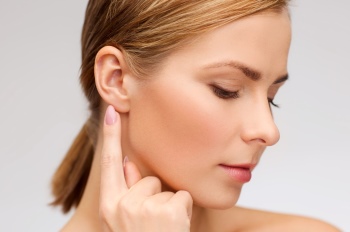
The patient is prescribed pills that help normalize blood pressure, kill infection, or relieve swelling. Some cases require surgical intervention, and during pregnancy the symptoms go away on their own.
Patients diagnosed with osteochondrosis are offered massage courses, acupuncture and a set of exercises aimed at removing salts. Recommended for people with atherosclerosis special diet, reduces cholesterol levels, and cancerous formations are removed surgically, after which chemotherapy is prescribed.
It is necessary to give up products containing caffeine and get rid of nicotine addiction. Try not to attend loud concerts, avoid noisy places, or protect your ears with earplugs or earplugs.
You cannot make a diagnosis yourself and self-medicate if a person does not have a special medical education. The consequence may be hearing loss or death. In some cases, it will take more than one month to deal with the problem, but if you follow all the doctor’s recommendations, the pulsating noise and the disease that caused it will definitely disappear, and the person will return to a healthy and fulfilling life.
Pulsatile tinnitus can occur at any time. It is not a consequence of physical or emotional stress. It may be accompanied by pain in the heart, head, and even hearing loss. Such a person becomes irritable, nervous, depressed, and is unable to get enough sleep. There are times when the noise is so strong that it completely disrupts normal existence. Noise and pulsation in the ears are not actually a pathology, but if it occurs regularly, then this indicates consequences serious illnesses, the presence of which should be consulted with a doctor.
In the medical literature, tinnitus is called tinnitus. Most often, in every fifth person, it manifests itself at the age of 55 years. This is due to age-related changes, hearing impairment. And also this pathology typical for workers in noisy enterprises: they experience constant impact on the hearing aid. DJs are susceptible to this too occupational disease.
It is very difficult to identify the noise, since only the patient can hear it. Therefore, there is such a thing as “subjective noise”. It cannot be heard or measured by any diagnostic instruments. Moreover, it is a symptom of a number of diseases.
The pulsation can appear constantly, or it can occur intermittently in only one ear or on both sides. Depending on how the patient reacts to noise, his condition is classified according to degree:
- the first is mild: the patient calmly tolerates the discomfort;
- second, the noise is felt most acutely at night;
- the third is constant noise, which makes it impossible to fall asleep;
- the fourth – completely unsettles the patient and interferes with his work.
There is no need to wait until the fourth degree of tolerance to see a specialist. The sooner the cause of the pulsating noise is identified, the easier it is to eliminate it.
Causes and symptoms
What are the root causes of the development of tinnitus, why does it pulsate in the ears? This symptom may occur due to:
- blockage of the ear canals with wax;
- eardrum injury;
- inflammatory processes in the ears;
- osteochondrosis of the cervical vertebrae;
- long-term use of regular Aspirin;
- high blood pressure, as well as its sharp jumps;
- pregnancy due to problems with hormonal system women. Accumulates in the body large number liquid, which creates the effect of noise and pulsation;
- using headphones;
- formation of malignant or benign tumors in the head or cervical spine;
- frequent stress, nervous overexcitation, lack of sleep;
- atherosclerosis or other pathologies cardiovascular system.

From a medical point of view, the causes of pulsation and noise are classified according to the diseases that led to the occurrence of such symptoms. This:
- oncological diseases;
- pathologies of the cardiovascular system;
- illnesses resulting from injuries;
- pathology of the ear itself.
Malignant or benign tumors, which are formed in the head or cervical vertebrae As they grow, they block the arteries, thereby disrupting the flow of blood to the brain and ears. And as a result, a constant pulsating noise in the ears occurs. When the tumor is located in the head and, depending on which hemisphere, noise may occur in the left or right ear. That is, there is a direct relationship between the location of the tumor and the side of manifestation of tinnitus. In the case of cervical tumors, noise occurs in the right ear and in the left at the same time.
If the cause of the pulsating noise is vascular or heart disease, then dizziness and severe headaches occur. Symptoms intensify with sudden head tilts, heavy lifting, and even in supine position. If the pulsation coincides with the heart rhythm, then the patient can be diagnosed with problems with blood pressure. But in case of a discrepancy, most likely the cause was atherosclerotic blockage of the vessels of the brain or cervical spine.
As a result of traumatic brain injury or damage to the ears themselves, the flow of blood to the damaged area is disrupted. This results in a noise that increases as inflammation or swelling increases.
The ears also begin to pulsate in case of inflammation of the ear itself - otitis media. In this case, the inner, middle, and outer ear may become inflamed. Also, noise appears when earwax forms in abundance, which leads to the formation of cerumen plug. As a result of such diseases, the brain begins to incorrectly perceive sound waves, which, when distorted, can manifest themselves in the form of ringing, noise, or hum.
Treatment of the causes of tinnitus
Pulsatile tinnitus is a symptom caused by another medical condition. Therefore, treating it independently can only lead to even greater complications. The main thing in the treatment of tinnitus is to identify the causes of its formation, that is, to determine what pathology could cause the consequences we are considering. For this purpose they carry out full complex examinations, which consists of:
- examination by an ENT doctor to identify plugs in the ears or foreign objects, as well as inflammation of the outer ear;
- MRI of the head to diagnose various tumors or cysts;
- Dopplerography of cerebral vessels;
- audiometry, which measures hearing acuity;
- pneumoscopy;
- ECG and cardiologist consultations;
- blood test for cholesterol;
- neurologist consultations.
After identifying the causes and appropriate treatment is prescribed. So, when a plug is detected, it is simply removed, and that’s all. If otitis is diagnosed, then anti-inflammatory drugs are prescribed in the form of ear drops and, if necessary, antibiotics. The most common cause of pulsating ears is hypertension. Therefore, when this pathology is detected, the patient is prescribed tablets for hypertension, and, if the treatment is effective, the noise disappears literally within a few days.
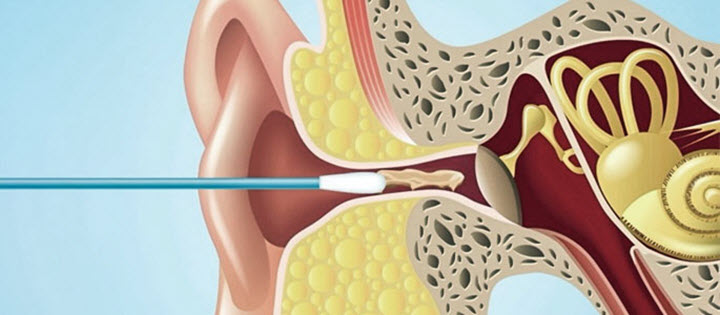
As a result of the examination, atherosclerosis was discovered. In this case, medications for the formation of blood clots, blood thinners, and a low-cholesterol diet are prescribed for treatment. But if all these measures do not help eliminate the noise, then you may need to surgery to remove a section of a vessel that is blocking the blood supply. The operation will also help eliminate noise when it is caused by the formation of tumors in the brain or in the organ of hearing itself.
If the cause of tinnitus is osteochondrosis, then a whole complex therapy. It includes: therapeutic massage, physiotherapy, drugs for pain relief and to improve metabolism, therapeutic exercises. All these funds are necessary to normalize blood circulation and saturate the head cells with oxygen, since their insufficiency leads to the death of brain cells.
The cause of tinnitus can be age-related destructive processes both in the brain itself and in the inner ear. To treat this pathology, drugs are used that improve blood circulation, anti-sclerotic agents, and vitamins. But they only alleviate the patient’s condition, and complete cure in this case no.
If noise occurs due to injuries to the hearing organ, antiseptic, analgesic, and antibiotics are prescribed. In case of damage to the eardrum, the ear canal is disinfected and anti-inflammatory drugs are prescribed. antibacterial agents, as well as proteolytics, which remove tissue that has died as a result of injury. After the measures taken, the patient undergoes myringoplasty, that is artificial restoration eardrum.
It should be noted that treatment is selected by a specialist and should not be neglected. Self-prescribing medications to relieve tinnitus is irresponsible and dangerous. This also applies to folk remedies. They can be used only after finding out the causes of tinnitus and consulting with your doctor.
Preventing tinnitus
It is known that it is better to prevent a disease than to take treatment. That's why they're so valuable preventive measures. Tinnitus is not an independent disease, but only a manifestation of other pathologies. Therefore, for prevention, you can use restoratives physical exercise for the musculoskeletal system, as well as to maintain muscle tone. This will at least get rid of osteochondrosis. And also an important means of preventing violations can be called proper nutrition. Eating required quantity vitamins, minerals, useful substances and refusal harmful products will help protect you from many diseases.
To prevent damage to the hearing organ itself, you can do the following:
- Clean your ears regularly, being very careful not to damage them;
- bad habits have a detrimental effect on the entire nervous system of the body, including auditory nerve. This means that we should put an end to them as soon as possible;
- stop taking Aspirin regularly, since there is a direct relationship between the occurrence of tinnitus and the use of this drug;
- limit salt intake. It promotes fluid retention in the body, as a result of which the inner ear can become deformed;
- limit exposure to loud sounds;
- use headphones infrequently.
The following tips will help not only prevent the occurrence of pulsating noise, but also significantly reduce it if it is present.
Throbbing pain in the ear, tinnitus, and also tinnitus, the first sign of a disorder of the cardiovascular system. Pulse in the ear and tinnitus are similar in nature and rhythm to pulse beats. This can cause nervousness, decreased activity, insomnia, and in severe cases The degree of the disease may increase and lead to the development of other diseases. The question arises, what to do and what causes noise in the left ear and in the right, and what are the reasons for its appearance?
Whatever the reason for the formation of beatings and pulsations in the ears, it is an extremely uncomfortable and painful feeling, and the consequences of it are not only a distortion of the quality of hearing, but also nervous disorders. The main reasons may be changes in the hearing aid, depending on age. Inflammation or infection in the auricle, ear injuries, changes associated with pathological diseases of the cardiovascular system, as a result of which the flexibility of blood vessels decreases.
Very often, the cause of the disease is ordinary stress. And excessive accumulation earwax, in severe cases, becomes the reason for a change in the quality of external hearing and aggravation of noise inside the ear, and you can hear how it pulsates in the ear. This increases the pulsating noise in the ear and vibration. Regular aspirin frequent use, also negatively affects the inner ear. During pregnancy, you can also feel that the pulse is heard and the blood is pounding in the right and left ears, discomfort may appear due to changes and restructuring of the expectant mother’s body.
Excessive listening to music at high volume can affect the middle ear, and this can also become a source of disease. Besides, sharp changes pressure may affect the ears.
Diseases of the cardiovascular system
Pulsating noise and vibrations in the ears directly depend on the cardiovascular system. And often with inflammation of diseases of the cardiovascular system, a person’s blood pounds. This is due to the fact that pulsating noise occurs during physical exertion and when there is a tight sensation in the neck.
The main ailments of the cardiovascular system, the cause of which is pulsating noise, are:
- Atherosclerosis, it is formed due to the fact that the elasticity of the vessels is lost and they stop pulsating simultaneously with the heart, accordingly, a pulsating sound is felt in the ears.
- Hypertension and hypotension, with this disease the blood vessels arterial system stop functioning according to the required mechanism, subsequently blood pressure fills capillaries inner ear. Accordingly, the sound of pulsations in the ears increases.
- IN blood vessels a small malfunction also occurs, and they stop proper blood circulation. This happens if the artery is refracted and there is a bend in it, accordingly the blood hits the walls of the vessels and cannot move further.
- Malfomation of blood vessels - leads to the fact that carotid artery narrows. Initial signs becomes: an increase in pain if a person lies for a long time or after sleep, as well as frequent headaches, and noise, pulsation in the ears and ringing intensify only in the evening.
- Osteochondrosis of the vertebrae of the neck. The vertebrae of the cervical spine may protrude and put pressure on nerve endings and blood vessels, this leads to different nervous disorders, with symptoms such as neck pain, pulsation in the right or left ear (depending on which direction the bone disc moves), noise, advanced cases an audible ringing is felt and headaches become more frequent.
Hearing diseases
A sulfur plug occurs when sulfur begins to be actively produced. If you do not clean it out, a plug will form later. Otitis. When there is a disease in the ear, moisture forms, the process of water release is disrupted, it accumulates in the ear, and after some time the liquid turns into pus - accordingly, the ear becomes inflamed.
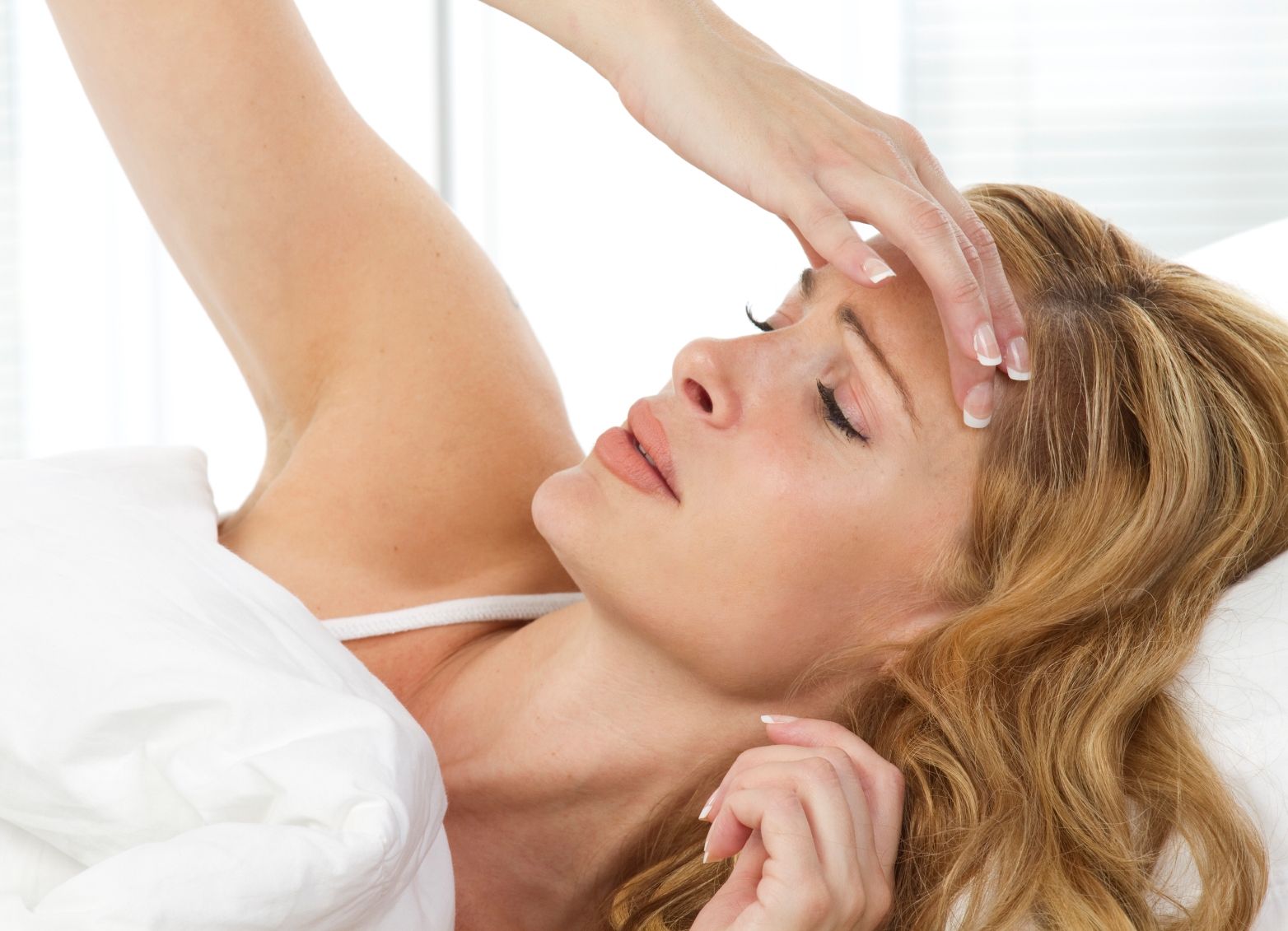
Injuries are often the consequences of mechanical bruises or traumatic brain injuries (on the left and on the right). Painful pulsations appear within a couple of moments if you hit your head. Painful sensations(usually they appear on the side on which the injury occurred) can only intensify due to the fact that clots of stagnant blood appear, and the pulsation of blood through the vessels will be complicated.
If pain in the ear does not go away for a long time, this may be one of the reasons for the development of a tumor (benign or malignant) in the neck or auditory organs.
The tumor affects the vessels that are located near it. Pulsating tinnitus and its causes often indicate that the functioning of the hearing organs or a separate part of them that transmits sound signals from environment. Such malfunctions in the middle and inner ear cause very strong pulsations. Very often the bone structure of the ear labyrinth becomes inflamed, causing injury and damage to the functions of the auditory cells that are responsible for hearing.
Treatment of pulsations in the ear
Causes and treatment are interconnected. In some situations, pulsations in the ear do not go away within a short period of time, then you should definitely consult a doctor, since discomfort in the ear is not separate disease, but evidence of another disease. But before going to the doctor, you should definitely eliminate bad habits. Then a consultation with an otolaryngologist is necessary. If no diseases of the hearing organs are found, then you should be examined by a neurologist, and, if desired, by an angiosurgeon or oncologist.
The necessary treatment for pulsations depends on what is causing them, with various diseases the doctor will prescribe: appropriate ear drops and ointments, ear rinsing antiseptic drugs, taking antibiotics, physiotherapy, anti-inflammatory drugs, heating and compresses. In addition, the doctor prescribes drugs to increase blood circulation in the brain, drugs aimed at improving blood circulation in the brain, and drugs to relieve irritation nervous system, sedatives, antidepressants, sleeping pills. You should also avoid foods with cholesterol.
![]()
In advanced cases it is possible surgery. Proper hygiene required hearing aid, you need to give up the need to use ear sticks, which can easily injure eardrum, and the walls of the ear, which can often lead to infection.
It is also worth giving up listening to music on headphones with a strong sound supply. And after each use of the headphones, it is necessary to treat the device with alcohol. Will also have a positive impact long walks in nature, which will help reduce pulsating tinnitus.
The patient is strictly forbidden to be nervous or be in stressful situations, overwork, listen to loud music, watch movies, do heavy physical activity, however, do not forget that you cannot lead and sedentary lifestyle life, forget to accept sedatives and get overtired. And be sure to remember that you should consult your doctor before using any medications.
Traditional therapy
There are also traditional methods treatment of pulsations in the ears. Treating these diseases is quite simple. Treatment with ammonia will be beneficial for the patient. You need to dissolve 1 tbsp. a spoonful of ammonia in 200 ml of boiled water, and then moisten gauze or a napkin with the resulting solution and apply to the forehead for an hour. With such compresses, tinnitus goes away within a week.
Treatment with honey and viburnum will also help. It is enough to make a mixture of ground viburnum with honey and wrap it in gauze bandage, which will be rolled up in several layers, leave in the auricle overnight and the pulse in the ear will decrease. And within two to three weeks the tinnitus will subside and you will be able to get rid of the disease and even improve your hearing.
Indispensable in the fight against the disease will also be congee. For an anti-inflammatory agent you need 3 tbsp. Pour two large glasses of water over spoons of rice overnight. In the morning excess liquid drain through cheesecloth and add two more glasses of water. Then cook the rice for 3 minutes, removing the film. IN ready mixture add 3-4 cloves of garlic and eat. If you practice every day, then after a while sore ear will stop vibrating and the pain on the left and right will disappear forever, it will no longer bother you. You will forever get rid of pain and noise in your right ear and left ear. Painful sensations will not bother you, and you will stop asking questions “what to do?” and "why?" noise in the ear.
Throbbing in the ears may be different character: pulsating, ringing, resembling clicks, accompanied by a feeling that the ear is blocked. If such sensations are not painful, short-lived and occur rarely, then they are not dangerous, since the cause may be simple physical overexertion or a jump in pressure or temperature.
If noise and pain are constant, combined with dizziness and darkening of the eyes, and also interfere with sleep, it is recommended to consult a doctor. Pulsation itself is not a disease, although it has its own name - tinnitus. This condition may be a symptom wide range diseases.
Causes of pulsation
- hearing loss as a result professional activities or damage by sound waves;
- contusions;
- sinusitis;
- inflammation in the ear;
- atherosclerotic lesions or osteochondrosis of the cervical spine;
- hypertension;
- migraines;
- food poisoning;
- psychiatric illness;
- insomnia caused by mental or emotional stress.
High blood pressure
The most common cause of pulsating ears is hypertension. Thus, the patient feels the movement of blood through the vessels. It is recommended to consult a doctor in cases where the pressure remains at 140/90 for several days.
To make a diagnosis, a specialist measures blood pressure and also advises the patient to do the same, keeping a special diary and recording the results of measurements at rest and after exercise. Indicators of blood and urine tests and cardiograms are also analyzed. If hypertension is indeed the cause, then appropriate treatment is prescribed aimed at normalizing the pressure, and the pulsation disappears.
Inflammation
In this case, discomfort is usually felt on one side. Treatment consists of using antiseptics, physical therapy methods, and in difficult cases, taking antibiotics. Vasoconstrictors will also help eliminate pulsating tinnitus.
Inflammatory processes are accompanied by throbbing pain, accumulation of exudate, and increased temperature
Atherosclerotic lesions
Disruption of normal blood circulation due to atherosclerosis leads to insufficient nutrition of the brain, resulting in dizziness, noise in the head and auditory receptors.
Additional symptoms in in this case can perform fatigue, memory impairment, hypertension. After diagnosis, treatment is prescribed, which can be either medicinal or surgical.
Osteochondrosis
Deformation of the intervertebral discs, which occurs with osteochondrosis, also disrupts normal blood flow. What happens is approximately the same as with atherosclerosis: blood does not flow to the brain in the required volume, and the blood supply to the outer and middle ear deteriorates.
This condition is accompanied by pain in the neck, back of the head, deterioration of vision and memory. It can be accompanied by ringing, crackling, and clicking sounds.
Treatment of pulsation in this case involves the use of physiotherapy, exercise therapy, and drugs to speed up metabolism.
Temporary pulsations can be caused by:
- excessive consumption of alcohol and coffee;
- prolonged use of furosemide, gentamicin, aspirin and a number of other drugs characterized by ototoxic effects.
- hormonal changes.
Other factors
Even the absence of any diseases does not guarantee that tinnitus will not bother you. It often occurs in people who are constantly exposed to stress.
If you notice that pulsation in the ear occurs after a difficult day filled with emotions, then taking sedatives. Good effect gives breathing exercises, it is also necessary to ensure access to oxygen - it is better to leave the window open.
Injuries to parts of the ear can cause swelling and poor circulation, which will result in the development of a pulsating sensation.
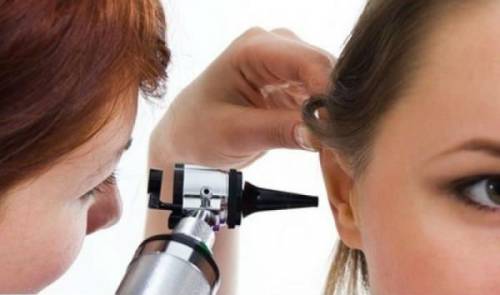
Tumor growth can also lead to compression of blood vessels. In this case, the pain occurs only on one side
IN in rare cases When a cervical tumor develops, it can be felt in both ears. That's why you need to consult a specialist for advice.
Folk recipes
This will help you cope with any discomfort: folk remedy. Cut out the middle of the onion, sprinkle cumin seeds there, put it in the oven and keep it until the onion becomes soft. Then squeeze out the juice and instill three drops 3 times a day.
What a person should not do if he feels a pulsation:
- be near the source loud sound(and don't use earplugs);
- get nervous, aggravate the stressful state;
- refuse to take sedatives;
- smoke;
- allow overwork;
- drink alcoholic beverages;
- allow excessive physical activity;
- take medications without consulting a doctor.
Treatment, if pulsation occurs frequently, must be entrusted to a professional, since it is necessary to make the correct diagnosis as quickly as possible.
